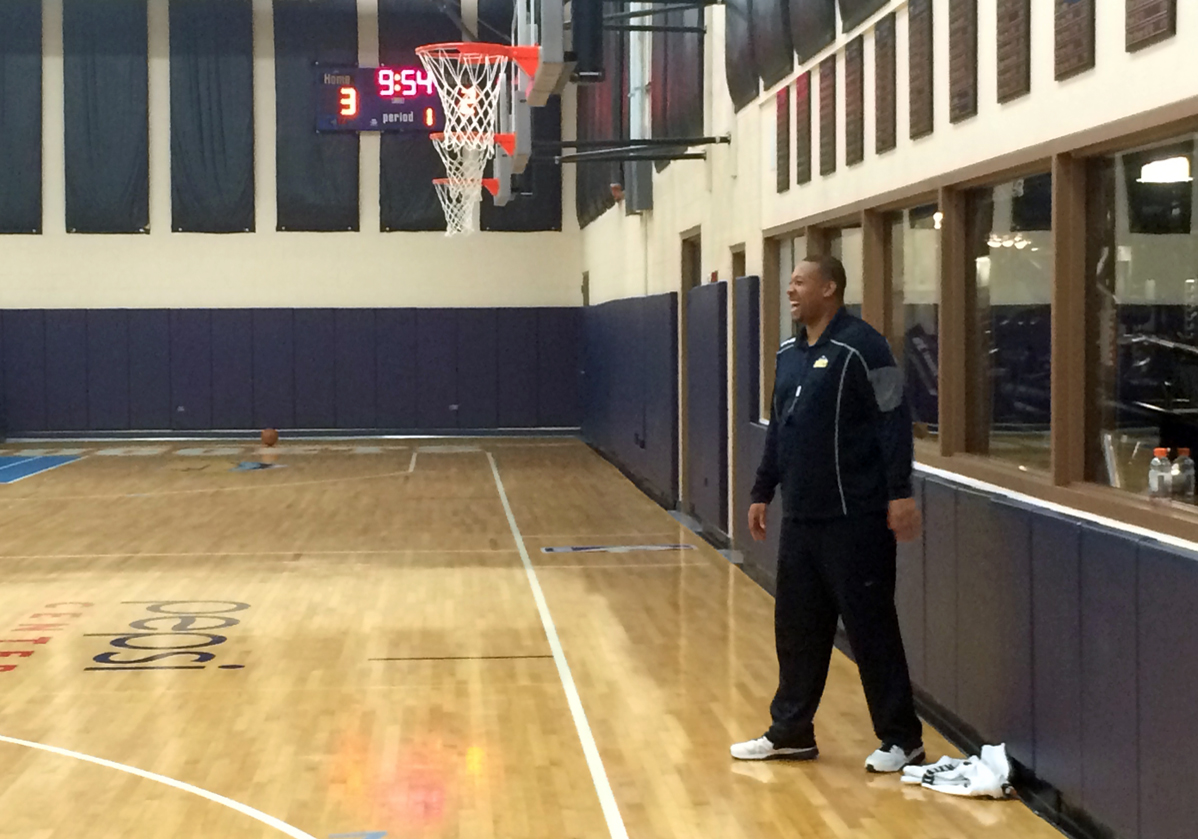The Local newsletter is your free, daily guide to life in Colorado. For locals, by locals.
Denver Nuggets interim head coach Melvin Hunt is focused on building a lasting foundation for the team—even if he doesn’t end up getting the job. Hunt speaks openly about constructing a singular mindset, creating partnerships with the players and coaches. In his mind, he’s not leading troops into battle—the way some coaches think—but taking on the role of teacher.
“I learned a great lesson from my mom. She always talked about the classroom,” Hunt said after a recent Nuggets practice. His answers are full of an ease and depth that many professional coaches don’t naturally come by. “The basketball arena and the basketball court are my classrooms.”

Since Hunt was appointed interim coach in March, he has changed the atmosphere around the hopeless 2014–15 Nuggets—a team that will not reach .500 by season’s end, despite their recent success (8–7 since Hunt took over). Hunt’s predecessor, two-year coach Brian Shaw, seemed to foster an attitude of players versus coaches. He even accused players of intentionally losing games. The situation became so dysfunctional that management had no choice but to make a change in an attempt to salvage the fractured pieces of the once perennial playoff team.
Hunt, a Nuggets assistant coach for five years, immediately began restoring order. His short-term mission was to encourage his players to play their best, and as a result, he sparked chemistry within the ranks of players and coaches. This hands-on strategy requires buy-in from the players, but Hunt believes it also requires individual attention from the coaching staff.
“That’s one of the things that I think is underrated as coaches,” Hunt says. “Sometimes we don’t see the importance of getting to know our players. We want them to come in and do their jobs. I think you get more out of them once you get to know them.”
Leadership in sports is often identified by bravado, toughness, and grit. There are few examples of servant leaders on the basketball bench, but Hunt’s vision for each of his players as well as the organization is refreshing. For nine years they were George Karl’s Denver Nuggets. Then, for a dispiriting year and a half, they were Brian Shaw’s team. Now, the vibe in the Nuggets locker room is that the team belongs to everyone. Melvin Hunt is just the conductor.
But don’t mistake Hunt’s inclusive leadership style for a lack of drive. He wants to win. Despite the front office limiting some of his players’ game availability, the Nuggets are playing fun basketball again, even if their roster needs upgrades before it can compete for an NBA playoff spot. Hunt’s reinvigorated system creates space for young players and veterans, especially forward Danilo Gallinari, who shines under Hunt’s leadership after struggling with injuries for two years.
After this season ends, the Nuggets will need to make a tough decision about who will lead their coaching staff. They may go after a “big name,” like former Nuggets head coach Mike D’Antoni, but at this point the management needs to decide if that’s what’s best for the team.
The gutsy hire would be Melvin Hunt. Not because he’s likable or a charismatic leader, but because he will take the time to learn, teach, and mold the Nuggets—not just coach them. Hunt is a team guy first and a head coach second, and he doesn’t change that attitude for anyone.
“The greatest compliment I’ve gotten came from my kids,” Hunt says. “They told their mom, ‘Daddy coaches the Nuggets just like he coaches us,’ and I just smiled. My heart leapt with joy because that’s what I wanted to be. Whether I’m an assistant coach, a head coach, or an associate head coach, it doesn’t matter. I’m a basketball coach.”








